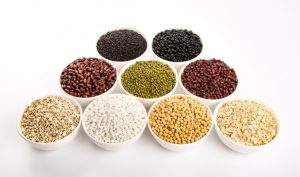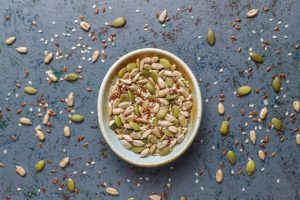Indian Diet Plan for Multiple Sclerosis PDF
Multiple sclerosis (MS) is a chronic autoimmune condition. It affects the central nervous system, leading to fatigue, muscle weakness, difficulty walking, and vision problems. Although there is no cure for MS, proper nutrition plays a key role in managing symptoms and improving quality of life. An Indian diet for multiple sclerosis is rich in diverse, whole foods. It can provide support to patients with MS. The main aim of this Indian diet plan for multiple sclerosis is to provide essential nutrients, reduce inflammation, as well as to promote overall well-being in the patients.

In this article, we explore a balanced Indian diet plan specifically tailored for those with multiple sclerosis. The plan focuses on foods that can support immune function, improve energy levels, and potentially ease MS-related symptoms.
Which Foods are Best for MS?
A list of the categories of foods that are important in managing MS is as below;
- Anti-inflammatory Foods: Redcuce inflammation of the nerves as well as reduce flare-ups and symptoms
- Vitamin D: Sunlight exposure and vitamin D-rich foods are vital to avoid disease progression
- Omega-3 Fatty Acids: These healthy fats are helpful for their anti-inflammatory properties
- High Fiber: Helps prevent constipation and promote gut health
- Antioxidants: Protect the body’s cells from oxidative stress, which can further damage nerve cells in MS patients
- Hydration: Dehydration can exacerbate MS symptoms like fatigue and muscle cramps
Indian Diet Plan for Multiple Sclerosis
What Foods Are Good for Multiple Sclerosis? Indian Foods for Multiple Sclerosis
An Indian diet plan for multiple sclerosis can incorporate various nutrient-dense foods. Below are some key ingredients and food groups that are beneficial for individuals with MS:
1. Leafy Greens and Vegetables

Leafy greens not only provide antioxidants, vitamins, and minerals but also help manage inflammation and support overall health.
- Spinach: Rich in iron, folate, and vitamin K. Spinach helps in better brain health, better gut health and reduces inflammation.
- Fenugreek: Has anti-inflammatory properties, it also aids in digestion and regulates blood sugar levels. Benefits of fenugreek.
- Kale, Sarsoo, and Cabbage: These are rich in fiber and antioxidants that combat oxidative stress.
2. Whole Grains

Whole grains provide energy and fiber. Fiber is essential in multiple sclerosis patients to fight constipation issues.
- Brown Rice: Has fiber and magnesium that stabilizes blood sugar and provides a steady source of energy.
- Millets (Bajra, Jowar, Ragi): These gluten-free grains are rich in fiber, antioxidants, vitamins, and minerals.
- Oats: Has soluble soluble fiber, oats help with bowel regularity. It provides a steady rise in blood sugar and avoids insulin spikes.
3. Legumes and Pulses

Legumes are rich in plant-based protein, fiber, and essential nutrients that are vital for nerve health and immune support.
- Lentils (Masoor Dal): Rich in folate and iron, which are important for the nervous system.
- Chole: High in protein and fiber,
- Moong Dal: Mung beans are easy to digest and are rich in antioxidants, fiber, and protein.
4. Healthy Fats and Omega-3 Rich Foods

Incorporating healthy fats, particularly omega-3 fatty acids, is crucial for reducing inflammation and promoting brain health.
- Flaxseeds: Flaxseeds are an excellent source of omega-3s and can be added to smoothies or sprinkled on meals.
- Chia Seed: Chia seeds Provide fiber and help with digestion.
- Nuts and Seeds: Walnuts, Almonds, and pumpkin seeds provide essential fats, antioxidants, and protein for nerve repair and brain function.
5. Anti-Inflammatory Spices and Herbs

Spices have anti-inflammatory and antioxidant properties, which makes them beneficial for MS patients.
- Turmeric: Haldi has an active compound curcumin has strong anti-inflammatory properties that may help reduce MS symptoms and support brain health.
- Ginger: Adrak reduces inflammation and helps with nausea.
- Cumin and Coriander: These spices help with digestion and have anti-inflammatory and antioxidant properties.
6. Fruits

Fruits are packed with vitamins, minerals, and antioxidants that are essential for managing MS. Focus on fruits that are rich in vitamin C, potassium, and antioxidants.
- Berries (Strawberries, Blueberries): Antioxidants in berries protect the nerve cells and help reduce inflammation.
- Citrus Fruits (Oranges, Lemons): The vitamin C content of citrus fruits supports immune function.
- Apples, Papaya, and Bananas: The fiber and vitamins in the fruits promote digestive health and provide healthy calories.
7. Dairy and Dairy Alternatives

MS patients may experience bone density loss. Dairy products are an excellent source of calcium, which is vital for bone health.
- Low-fat curd: Rich in probiotics, yogurt supports gut health and immune function.
- Paneer: A good source of protein, calcium, and healthy fats, paneer can be included in various Indian dishes.
- Fortified Plant Milks (Almond, Soy, Oat): These are great alternatives for those who are lactose intolerant or prefer plant-based options. Look for options fortified with vitamin D and calcium.
8. Hydration

Staying hydrated is essential for people with MS, as dehydration can worsen symptoms like fatigue and muscle cramps. In addition to drinking water, try herbal teas or infused water with ingredients like mint, lemon, or ginger.
Indian Diet Plan for Multiple Sclerosis
Here’s a simple, sample Indian diet plan for multiple sclerosis that will help you in managing symptoms.
Breakfast: Oats porridge with chia seeds, walnuts, and a drizzle of honey OR Palak and mung dal appam + coconut chutney + 1 orange OR a smoothie made with spinach, banana, and chia seeds
Mid-Morning Snack: A handful of almonds or pumpkin seeds + green tea with ginger
Lunch: Brown rice or quinoa with a bowl of masoor dal+ palak paneer sabji with garlic and cumin + cucumber and tomato salad
Afternoon Snack: A bowl of mixed berries or papaya + herbal tea (turmeric or chamomile)
Dinner: Ragi or jowar roti with mixed vegetable curry (made with vegetables like carrots, capsicum, and beans) + 1 cup curd with rock salt and jeera OR 1 cup kadhi
Bedtime: A warm cup of turmeric milk (with almond or soy milk)
End Note:
A well-balanced Indian diet plan for multiple sclerosis focuses on reducing inflammation, supporting brain and nerve health, and boosting immune function. Whole grains, anti-inflammatory spices, healthy fats, and nutrient-rich fruits and vegetables help manage the symptoms. It is important to understand that diet alone cannot cure MS, however, it can make a significant difference in disease management and improving the quality of life.
A personalized diet plan can help you better manage your situation, especially during flare-ups. You can email us at care@dietburrp.com or check our consultation information to obtain a personalized diet plan.

